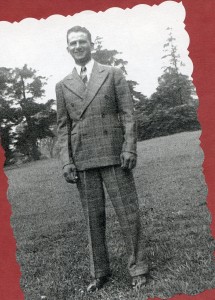 What don’t State Police officers do in the course of a career? They see all facets of the human comedy and tragedy, in both its rural and urban phases. A day of patrol may sometimes be uneventful, but a career of intimate travel and encounters with every part of every tribe – that is a ticket to experiences that resonate. I wonder that my father’s deepening silence as he aged was not in some form a kind of reverie where he saw again all these scenes that he alone among us possessed.
What don’t State Police officers do in the course of a career? They see all facets of the human comedy and tragedy, in both its rural and urban phases. A day of patrol may sometimes be uneventful, but a career of intimate travel and encounters with every part of every tribe – that is a ticket to experiences that resonate. I wonder that my father’s deepening silence as he aged was not in some form a kind of reverie where he saw again all these scenes that he alone among us possessed.
For my father, there were always accidents to confront and manage and investigate, and sometimes, though rarely and thankfully so, murderers to pursue. Most of the other cases referenced in The Book are less serious in terms of loss and threats to life but have within them gems of stories that showed the Troopers with whom he served and him so many sides of the human condition.
The new suit he bought for his interview to be accepted to State Police Training. He told my sister that this photo was taken the day of his interview.
There were lots of chases. What hunter doesn’t love a chase? He and two other Troopers gave chase to three 15 and 16 year old kids who had escaped from the Philadelphia Protectory in Phoenixville, stolen a car in Reading, stolen eleven gallons of gas in Robesonia and were finally caught in Myerstown. * They were only kids, but it would have made for a good day – the three Troopers together, driving west on Rt. 422, fully alert, hunting.
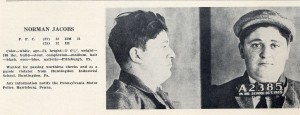 Three sets of mug shot photos taken from The Bulletin of the Pennsylvania Motor Police. These are the faces of some of the criminals Troopers of the time would have encountered. @@
Three sets of mug shot photos taken from The Bulletin of the Pennsylvania Motor Police. These are the faces of some of the criminals Troopers of the time would have encountered. @@
They found the lost – “A youth, several State Policemen and a game warden at 11 P.M. Tuesday found Calvin Boyer, fifty seven walking along a lonely mountain road, several miles from Colebrook. He had been lost in the mountains several hours and suffered numerous scratches about his face and hands as the result of his wanderings through briars and underbrush….” My father and a good friend, Trooper William Wert, “came upon the man” who said that “he was seeking his son” who he insisted was lost. “He was suffering from cold, and when asked by the officers why he had not lighted a fire to warm himself, he replied that he ‘didn’t want to burn the mountain down’.” *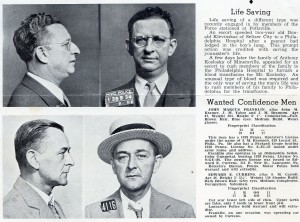
They aided sick children — in the days before Interstates and the Turnpike, they raced over difficult two lane roads on escort service for emergency transfers to hospitals. # A little girl had been diagnosed with “whooping cough and measles with pneumonia” and was sent to “the contagious ward … of the Harrisburg general hospital,” my father providing the State Police escort. This kind of shepherding service had been set in motion by the case of an 18 month old little girl from Richland who had died of diphtheria before she could be admitted to a special hospital ward; bureaucratic red tape had ensured her death. * Sometimes the story is achingly sad – a photo shows he and two other Troopers standing over a sled on which a six year old boy had died when he had coasted into traffic. @
All the State Policemen I met through my father were among the most brutally realistic and the most decent and compassionate of men – for them, the innocent and the weak counted the most; all of their protective impulses were aroused by their plight. The venal, selfish and callous actions of others earned their scorn. The stupid actions of others, as long as no one was injured, brought their knowing laughter or bemused smiles; during some of my father’s stories I would occasionally catch that universal cop head-shaking look that implied this question: – “what makes criminal human beings so dumb?”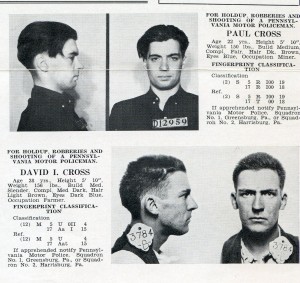
He encountered thieves and joyriders. He arrested a young man who had stolen garage tools and who “admitted stealing … dress gloves which were picked from pockets from coats in restaurants.” * He and his partner, Trooper Wert, picked up a “Harrisburg sailor” after the car he helped steal in Baltimore overturned near a farm; they caught him “as he tried to thumb his way to Lebanon … one and a half miles from where the car was abandoned.” *
He investigated $40 burglaries at farm tool companies, “the smashing of twenty window panes” in riding stables by snowballs, and he arrested a man who had written $665 in bad checks.* He and Trooper Wilt arrested a steelworker in Pottstown who shot his wife in the leg after she grew furious at his treating a live-in 21 year old girl to a drink — at 4 o’clock in the morning “George pulled his pistol from under the pillow in the baby carriage and pointed the gun directly at me and fired.” * I would have loved to have heard that story.
When he worked conducting driver’s examinations at Reading, he described a “woman who came in with a ‘seeing-eye girl’ to help her take the test. The girl assistant was grounded and without her, the myopic woman failed to read a single sign.” ^
He opened and commanded a new-substation in Hamburg, and attended classes in bomb recognition at IndianTown Gap.
He helped break up chicken robbery sprees: “One of the biggest Chester county chicken robberies in several months was cleared up yesterday when Elmer Drumbeller, 28, of Warwick, after a grilling and a night in jail, signed a confession to the theft of 100 chickens from the farm of Warren Hughes, Elverson, R.D.1.” He also gave up his theft of “three chickens and 12 gallons of gas from the farm of Frank Beerbrower….” A few days later, a second news item: “A State Trooper may have to arrest persons for alleged violations of the law. But that doesn’t mean the officer doesn’t have a heart. The other day Troopers at the Elverson barracks … arrested a Coventryville man on charges of stealing chickens. The man was committed to the West Chester jail. Behind him he left a 19 year old wife and a five month old son. The prospects of a warm Christmas were slim. There was little food in the house. So yesterday the Troopers went to work.” They visited the wife and brought her “canned preserves and woolen clothing “from the Red Cross, “a Christmas tree from the Salvation Army,” and “a huge box, $8 worth of groceries from a High Street food market.” Four Troopers and my father did this – Wilt, Egan, Dunlevy and Kurteson. Their names should be remembered. *
He posed for photos with Trooper Schmutzler; they were modeling “new summer uniforms.” *I would have loved to have heard his Trooper friends on that.
One inch items, now yellowing with age, suggest terrible scenes: “Local State Policemen Francis Bunch, J.B. Oberholtzer, Charles Wall and A.J. D’Angelo returned home at 3 o’clock this morning after serving as crowd and traffic directors near the Reading Airport yesterday when [a] TWA Constellation …crashed and burst into flames.” * Five died. He was the first Trooper to arrive at the scene when a “P-51 U.S. Army Mustang fighter plane crashed into Mt. Wilson … just before three o’clock Tuesday afternoon, and burst into flames after exploding ….” The pilot “escaped injury by parachuting to safety….” *
Many of the accidents brought their share of violent death that had to be endured; the Troopers had to find their own way of developing thick skins, and hard, tight lines of expression, and the capacity for calm when all around them was blood and moans. For example, he was the Trooper on hand when the coroner and Honey Brook’s Chief of police entered a home in Rockville and found “a 70 year old man, ill and living in squalid poverty, who … sometime Wednesday night … went upstairs to his … front bedroom and there in a bleak, bare room placed the muzzle of a shotgun to the left side of his throat and pulled the trigger with his bare toe.”
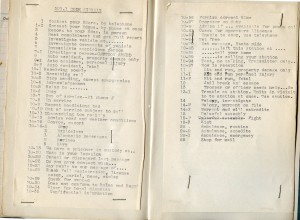 This Call Code List belonged to my Uncle, James O’Donnell, a State Trooper years younger than my father. He served on the Turnpike and in Harrisburg and came on the job in 1950.
This Call Code List belonged to my Uncle, James O’Donnell, a State Trooper years younger than my father. He served on the Turnpike and in Harrisburg and came on the job in 1950.
Even after he retired his time as a policeman, which he was down to the very ragged edges of his soul, did not end. Once he was called upon to walk into a home where it was suspected a terrible deed had been done.
Three door’s down from us lived Vic and Elsie, a childless couple in their early 60’s. Vic, an electrician by trade, raised roses and trained German shepherds; his two dogs remain the most well behaved Shepherds I have ever seen. He stood about 5’10” and had enormous shoulders. His only friends in the whole neighborhood were my father and mother. She would sometimes sit for hours in the kitchen and listen to him. I think she eased his loneliness. He genuinely liked my parents, but he was a brute and had that surface kindness with others who did not interfere with him that brutes often possess. I was wary of him but he tolerated me because of my parents.
Vic’s tirades against Elsie could be heard a block away. His voice cut steel. He beat her. Even as a naive young kid I knew something was off, that something was very wrong in that house. No one had seen him strike her, and Elsie never spoke of it to anyone, and this was an era when neighbors generally stayed out of the personal affairs of other neighbors. I remember the Township police officer, Lou Hemig (sp?), paying visits to their home, his car’s lights flashing against the darkened trees and houses.
We knew how to read the signal that he had gone too far. Elsie would walk past our home to Woodside and down to Penn Street, catch the bus into Reading and book a room at the Abraham Lincoln Hotel. She wore a small box hat, and even on the hottest days a simple cloth coat. Looking neither left nor right, speaking to no one, she carried her purse in front of her like a shield.
A few days later Vic would drive down the alley in his giant Buick Skylark station wagon, and an hour later they would return together. Their home would then be silent for a while. 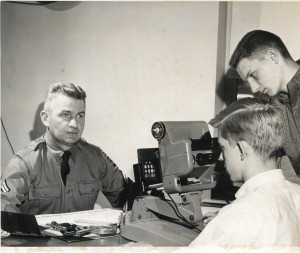
Lou Hemig (sp?), had been a friend of my father’s for years. All the kids knew him. He was well-liked. Sometime in the late spring in the mid-70’s, Lou came to visit my father. ** My brother and sisters and I were all out of the house – at work or in school. Vic’s neighbors, two older women, had listened to a terrible argument two nights before. It had ended suddenly. Then, for at least 48 hours, they had heard nothing. The dogs had not been in the yard. The house was shut tight. Lou knew that my father was Vic’s only friend and that he was a former State Policeman. He asked him to come with him this time.
My father as a Driver’s test Examiner. I don’t know why he has on that scary look.
As with most of the homes on the block, Vic lived in a brick twin –a wide front porch looked onto the street. When they walked onto the porch, the blinds that covered the big front window were open. They rang the bell. They looked in the window. No dogs appeared. They could see the living room, dining room and the stairs. Nothing seemed out of place. No one came to the door. They tried the doorknob. The door was unlocked and opened easily. When they stepped inside, my father stopped, called Vic’s name, Elsie’s name and then waited. It had been very warm for two straight days. They smelled nothing except dust and the remnants of cigarette smoke. Vic smoked unfiltered Pall Malls. The doorways to the kitchen, one at either wall to their left and right were unblocked. The cellar door was closed. No dogs appeared. 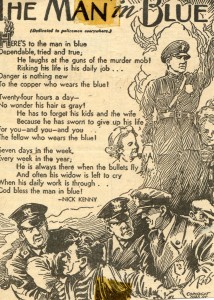
When they walked into the kitchen, their eyes went to the table against the windows on the far wall. A chair had been pulled out. Cigarette butts overflowed an ashtray and their ashes lay sprinkled over a note and a row of $20 bills. There were several hundred dollars neatly arranged in a row so that a part of each bill showed its edge. The note was addressed to my father. It said that the money was his and my mother’s in thanks for their kindnesses. It said that he [the writer] was sorry. There was no signature. The dogs’ dishes were in place.
The Flip Side of this poem indicates that my father cut this out of the paper in 1948. He’s 34, married for a year, a 10 year veteran, and if his preservation of this poem is an indication, he has not become jaded. This poem describes police life as akin to a kind of sacrificial priesthood and the officer as the most dependable of daily heroes.
Together, they explored the cellar. Nothing — everything meticulous and in its place. They climbed to the second floor — nothing in the back bedroom, the bathroom, the second bedroom. The beds were undisturbed. The master bedroom at the front of the house was empty, the bedspread folded neatly. My father found a damp, copper colored stain on the rug on what looked to be Elsie’s side of the bed. It smelled strongly of disinfectant.
There was nothing in the attic. They walked downstairs and outside into the back yard.
The garage window shades had been drawn, but the door was unlocked, and my father said that the stench hit them as soon as they cracked it open.
Cloths had been stuffed at the bottom of the garage doors and the entrance door. The front passenger and driver’s side doors of the station wagon sat wide open. Vic and Elsie’s bodies had formed a kind of pyramid in the middle of the front seat. His arm was looped around her neck. It appeared that he might have been holding her. The dogs lay stretched out in the back, tethered by their leashes.
Lou made the necessary phone calls. The money and note disappeared. I remember it being ruled a double suicide. I don’t know. My father was convinced that Vic had knocked Elsie out, that he had panicked and seen no way out, that he had sat at the kitchen table for a long time, that he had carried Elsie’s body out to the garage and placed her in the car, then fetched the dogs, sealed everything, got in and turned on the ignition. Elsie might have come back to consciousness as they waited or Vic may have reached for her in his final act.
I spoke with him the evening of the day their bodies had been discovered. His description was sober and quiet so as not to upset my mother. The details were precise. I remember him saying something along the lines of not understanding why some people do what they do, that we can never understand what goes through their heads.
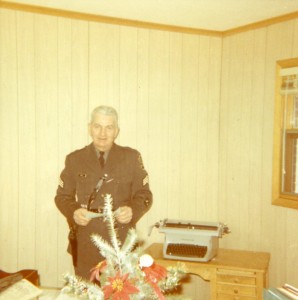 My father closing out his 5 1/2 years as OIC at Hamburg.
My father closing out his 5 1/2 years as OIC at Hamburg.
In the early days when they were being paid a pittance, cars were more expensive than policemen and so he would often drive with partners on patrol. As they slept in a barracks, one next to the other, he was with the men of the sub-station around the clock. They must have come to know each other as if they were children from the same family. I remember some of his friends’ names: Anselmi, Beemer, Brooks, Bunch, Erisman and Ebert, DeLeo, D’Angelo, Budjako and Chulick, Kinsella and Kramer, Oberholtzer and McAnnally, Petzak and Schmutzler and Wert. I’ve missed some, I know, but still, even with this shortened list, what a wealth of good will and good men upon whom one could depend. What a gift for all occasions!
*I am working from the newspaper clippings left in The Book. Most have had dates and newspaper names removed.
@@ The Mug Shot Photos, respectively, in order, from May 1, 1938; September 15, 1938; April 1, 1938.
#A haunting and foreboding moment – one I will write about in The Search # 12.
@The Lebanon Daily News: January 6, 1965: “Accident Scene.”
**I cannot nail down the time. The newspaper archive service I joined has not offered up any hits on Vic’s name or the incident. I don’t know why. My brother remembers only a small item on the event.
^The Reading Times: Saturday, May 5, 1958: “Driving Lures Fewer Applicants”.